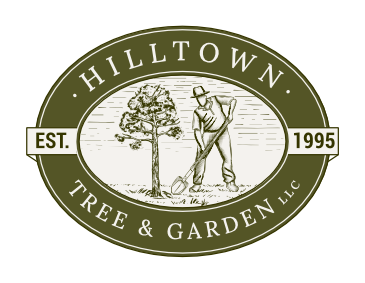Organic Pest Control – The Way Hilltown Tree and Garden Manages Pests:

Organic Pest Control, also known as Plant Health Care or Integrated Pest Management (I.P.M.), is the way Hilltown Tree & Garden manages pests. Practicing Plant Health Care will significantly decrease, if not eliminate, the use of hazardous chemicals in the landscape.
There are two main reasons to practice Plant Health Care. The first is that it will promote a balanced ecosystem that will have few if any deleterious effects on non-target organisms like humans, pets, beneficial insects, water or air quality. The second reason is that it works both in the short- and long-run if properly implemented.
Our Plant Health Care programs focus on keeping your trees, shrubs, and perennials as healthy and vigorous as possible. A proper combination of pruning, mulching, and organic fertilization allows your plants to use their own natural defenses. In some situations these are not enough or need to be used in conjunction with the application of a bio-rational pesticide. Examples of bio-rational pesticides are horticultural oils, soap, neem, or Bacillus thuringiensis (BT). There are many choices and Hilltown Tree & Garden’s certified arborists are trained in the various options.
In the rare case that conventional pesticides are needed, a Massachusetts licensed pesticide applicator and certified arborist will apply the pesticide in an environmentally responsible manner. An example of this is our use of the Mauget System. This is a system where small holes are drilled into the trunk or buttress roots. Then pressurized capsules with a small amount of fungicide, fertilizer, or insecticide are inserted into the holes. The tree takes up the product into its vascular system and is distributed throughout the entire tree.
|
 |
The benefits of this system are:
1. No off target drift
2. Longer residual effect 3. Reduced contact with beneficial organisms 4. Less likely to decompose by sunlight and weather |
|---|
The Mauget System is a proven method for controlling gypsy moth, hemlock woolly adelgid, eastern tent caterpillar, and forest tent caterpillar on large trees too tall to be sprayed with the bio-rationals, such as BT or horticultural oil.
Hilltown Tree & Garden takes its stewardship to the environment seriously. With an educated and holistic approach to pest management, landscapes can be managed in a way that benefits people, pets, trees, insects, air, and water.
|
Other helpful websites:
For My next workshop read below…
March 31st, 2012
10:15am-11:30am
Saturday
Dean Tech High school.
Instructor:
Jim McSweeney,
certified MA arborist and horticulturist
Natural Pest Control
Learn how to apply natural or “organic” pest control techniques in this wide ranging workshop. The class provides information on a variety of insect pests, diseases, and weeds. Find out what pest control methods work and do not work in the home orchard, ornamental and vegetable gardens. Feel free to bring sample pests and lots of questions. Leave the workshop with information to defend your landscape from unwanted pests, using the most environmentally sensitive and effective products available today.
|
|---|
Jim McSweeney owns and operates Hilltown Tree and Garden, landscape design, installation and tree care for Northampton and Western Mass. You can also find (and please “Like” us) on Facebook.




